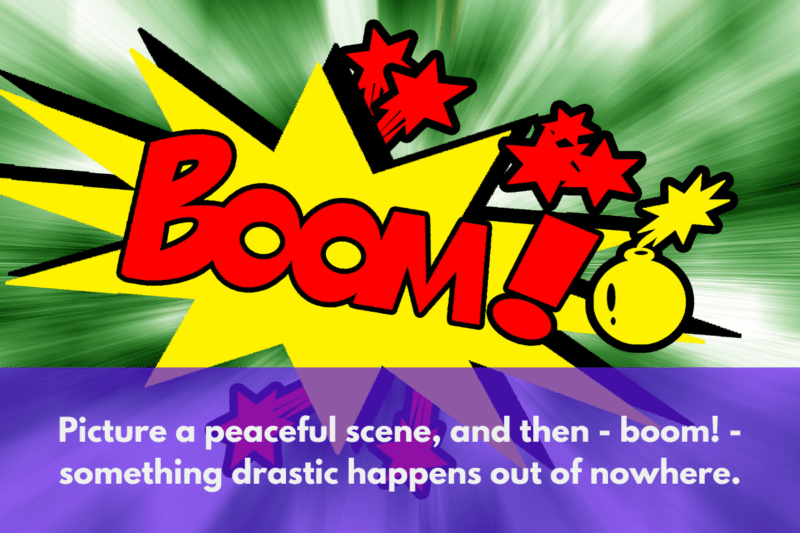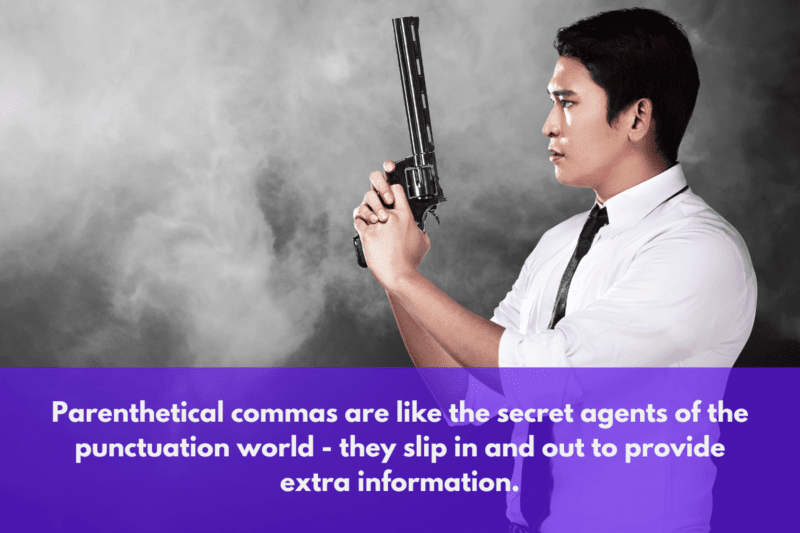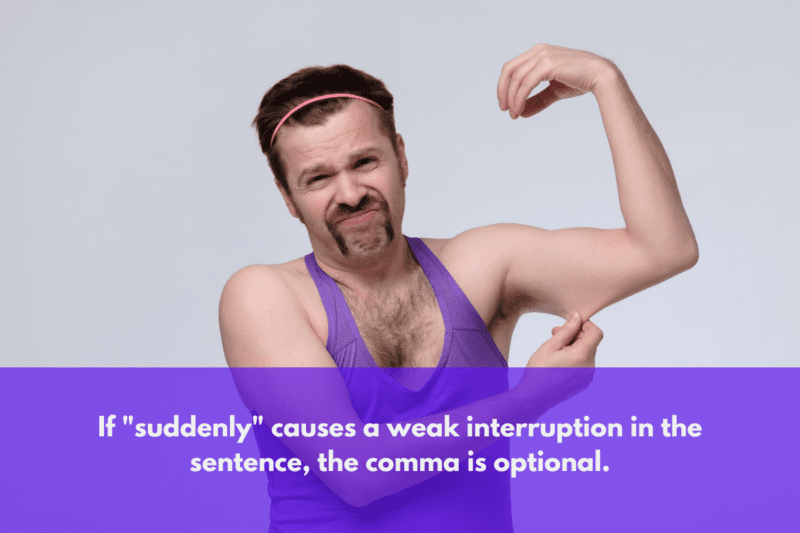Have you ever found yourself typing away, only to hit the brakes when that sneaky word “suddenly” pops up?
Fingers hovering over the keys, you’re paralyzed by the nagging question: do I stick a comma after suddenly or not? You’re not alone.
I remember constantly facing this struggle myself. Whenever “suddenly” appeared in my writing, I felt embarrassed as I resorted to Grammarly or Google for help.
It always seemed like such a simple thing, but for some reason, it made me feel kind of dumb.
But hey, it’s okay. We’ve all been there, stuck in the Bermuda Triangle of commas, feeling confused, insecure, and frustrated.
You’re human, and so are the rest of us who’ve faced this dilemma.
The good news? You’ve stumbled upon the Holy Grail of comma guidance tailored just for you. Buckle up because we’re about to embark on a wild ride through the mystifying world of commas and “suddenly.”
Once we’re done, you’ll strut away, confidence oozing from your fingertips, ready to write like a pro.
| General Topic | Key Takeaway |
| Understanding “Suddenly” | “Suddenly” is an adverb for quick, unexpected actions. |
| Comma After “Suddenly” | Use a comma in introductory elements, compound or complex sentences, and parenthetical constructions. |
| No Comma After “Suddenly” | Omit comma when “suddenly” modifies a verb, adjective, or adverb. |
| Optional Comma After “Suddenly” | For weak interruptions, comma usage is at the writer’s discretion. |
| Comma Before “Suddenly” | Use a comma for nonessential phrases or clauses. |
| No Comma Before “Suddenly” | Omit comma when directly modifying a verb, adjective, or adverb. |
| Optional Comma Before “Suddenly” | Comma usage depends on sentence flow and clarity; writer’s discretion. |
| Misconceptions & Mistakes | Commas aren’t always necessary before or after “suddenly.” |
| British vs. American English | No significant difference in comma usage with “suddenly” between the two English variants. |
Table of Contents
Understanding the Meaning and Function of “Suddenly”
First, let’s break down the word “suddenly” itself. What is it, and how does it work its magic in our sentences? “Suddenly” is an adverb that describes an action that occurs quickly or without warning.
Picture a peaceful scene, and then – boom! – something drastic happens out of nowhere. That’s when “suddenly” steals the spotlight.

For example, consider this sentence: “The quiet afternoon was suddenly interrupted by a loud crash.” See how “suddenly” adds an element of surprise to the action? It helps the reader feel the abruptness of the event.
Now that we’ve got a grasp on what “suddenly” is all about let’s explore how it plays with commas in various sentence structures and why commas are necessary or not in each case.
Placing a Comma After “Suddenly”
In this section, we will look at different sentence structures and explain when to use a comma after “suddenly” and the reasons behind it.
As an Introductory Element
Ever kick off a sentence with “suddenly” to pack an extra punch? You’re not the only one. When “suddenly” starts a sentence, it’s time for a comma right after.

The comma is used here to separate the adverb from the main clause, indicating a pause that helps the reader understand the suddenness of the action.
Here’s an example: “Suddenly, the lights went out.” Easy peasy, right?
In Compound Sentences
Compound sentences are like the dynamic duos of grammar – two independent clauses joined together by a coordinating conjunction (think “and,” “but,” “or”). When “suddenly” shows up in a compound sentence, a comma usually follows.
The comma separates “suddenly” from the rest of the clause, making it clear that the adverb applies to the action that follows.
Check this out: “She was enjoying her coffee, and suddenly, the phone rang.” Notice how “suddenly” is part of the second independent clause? Comma to the rescue!
In Complex Sentences
Complex sentences are a bit, well, complex. They’ve got an independent clause and at least one dependent clause. When “suddenly” pops up in a complex sentence, a comma often follows suit.
The comma is used to set off the adverb “suddenly” within the sentence, giving the reader a clear indication of when the sudden event occurs.
Here’s an example: “While she was walking her dog, suddenly, a cat darted across the path.” That comma after “suddenly” helps keep the sentence flowing smoothly and clearly conveys the abruptness of the event.
In Parenthetical Constructions
Are you using “suddenly” in a parenthetical construction? You bet a comma is involved.
When “suddenly” is used in a parenthetical, it’s typically surrounded by commas, like this: “The protagonist, suddenly realizing the truth, gasped in horror.” Just like a cozy hug, those commas keep “suddenly” snug and secure.

The commas here serve to separate “suddenly” from the main clause while also highlighting the sudden realization of the protagonist. This helps readers easily follow the action and understand the impact of the sudden event.
Common Misconceptions and Mistakes Regarding Comma Usage After “Suddenly”
Let’s set the record straight on some common comma missteps. When “suddenly” modifies a verb, adjective, or adverb, you might think a comma is needed. But, surprise! No comma is required.
In these cases, “suddenly” is closely tied to the word it modifies, and a comma would create an unnatural pause that could disrupt the flow of the sentence.
Take a look at these examples: “She suddenly stopped,” “The room became suddenly dark,” and “He ran suddenly faster.”
See? No commas in sight. So, if you’re feeling unsure, remember this simple rule: when “suddenly” modifies, commas take a hike.
If you’re finding this article helpful, be sure to check out our other insightful pieces on the blog as well, such as using commas after “happy birthday” and “thank you” for even more punctuation tips and guidance.
Parenthetical Commas Before and After “Suddenly”
Parenthetical commas are like the secret agents of the punctuation world – they slip in and out to provide extra information. When “suddenly” acts as a parenthetical element, it’s flanked by commas, like a VIP surrounded by bodyguards.

In this case, the commas separate “suddenly” from the rest of the sentence, emphasizing the additional information it provides while still maintaining the overall flow.
Here’s an example: “The wind, suddenly picking up, scattered the leaves.” Those commas are doing their job, keeping “suddenly” in check and clearly conveying the sudden change in wind speed.
Situations When No Comma Is Needed After “Suddenly”
There are specific situations where no comma is needed after “suddenly.” Let’s explore these cases and understand the reasons behind the absence of commas.
When Modifying a Verb
When “suddenly” modifies a verb, it’s a no-comma zone. For instance, take this sentence: “He suddenly jumped.”
“Suddenly” is modifying “jumped,” so there’s no need for a comma. In this case, the adverb “suddenly” is directly tied to the verb, and adding a comma would create an unnecessary pause that might disrupt the sentence’s flow.
When Modifying an Adjective
If “suddenly” is working its magic on an adjective, you can give commas a break. In a sentence like “The sky turned suddenly dark,” “suddenly” modifies “dark,” and there’s no comma needed.
Here, “suddenly” is closely connected to the adjective, and a comma would create an unnatural break in the sentence, making it harder for the reader to understand the suddenness of the event.
When Modifying an Adverb
Guess what? Even when “suddenly” modifies an adverb, commas aren’t invited to the party. Check out this example: “She spoke suddenly louder.”
“Suddenly” is modifying “louder,” and there’s no comma in sight. In this situation, “suddenly” is directly linked to the adverb, and a comma would create an awkward pause, detracting from the sentence’s overall flow and clarity.
Optional Comma Usage After “Suddenly”
At times, “suddenly” causes a weak interruption in a sentence, which may lead you to question if a comma is necessary. In these instances, the choice is up to you.

For example, take the sentence: “She looked up suddenly and saw the bird.” Adding a comma after “suddenly” might improve clarity, but it isn’t mandatory. When dealing with weak interruptions, trust your instincts and let your writing flow naturally.
Placing a Comma Before “Suddenly”
This section will explore the different situations where placing a comma before “suddenly” is necessary, not necessary, or optional. Understanding these rules will help you use commas effectively and enhance the clarity of your writing.
When a Comma is Necessary
There are situations where a comma is required before “suddenly.” This typically occurs when “suddenly” is part of a nonessential phrase or clause that provides additional information without altering the core meaning of the sentence.
For instance: “The dog, wagging its tail excitedly, barked suddenly.” In this example, “suddenly” modifies “barked,” and the comma separates the nonessential phrase from the main clause.
Another example: “The sky, once clear and sunny, turned suddenly dark.” Here, the comma is necessary to separate the nonessential clause from the main clause.
When a Comma is Not Necessary
In some cases, a comma before “suddenly” is not needed. This generally happens when “suddenly” is closely linked to the verb it modifies, with no extra information between the two.
For example, in the sentence “She suddenly screamed,” there is no need for a comma before “suddenly.”
Situations When the Comma is Optional
In the realm of comma usage, there’s often a gray area. Sometimes, deciding whether to place a comma before “suddenly” is at the writer’s discretion.
In a sentence like “He looked around and suddenly noticed the sign,” you could choose to add a comma before “suddenly” to enhance clarity, but it’s not a strict rule. Trust your instincts and let your inner writer take the lead.
Common Misconceptions and Mistakes Regarding Comma Usage Before “Suddenly”
It’s time to address some common confusion surrounding comma usage before “suddenly.” One widespread misconception is that a comma is always necessary before “suddenly.” However, as we’ve seen, that’s not always true.
When “suddenly” directly modifies a verb, adjective, or adverb, there is no need for a comma. For example, in the sentence “The temperature dropped suddenly,” “suddenly” directly modifies “dropped,” and no comma is needed.
So, when in doubt, remember this guideline: when “suddenly” is closely connected to the word it modifies, commas can take a break.
The Final Word: Conquering the Comma
Hey, we get it. Commas and “suddenly” can be a tricky combo that leaves even the savviest writers scratching their heads. It’s like staring at a puzzle, wondering where that elusive piece fits.
But guess what? You’ve just cracked the code, and now that puzzle is no match for you.
Think back to all those times you hesitated, unsure whether to slap a comma after “suddenly” or let it fly solo. You’ve come a long way, and now you’re armed with the knowledge to conquer those commas like a pro.
Remember all the insights and c tips you’ve picked up along the way? Those are your secret weapons, ready to be unleashed on the world.
So, here’s the deal: it’s time to silence that nagging voice of doubt and unleash your inner writing superstar. You’ve got the tools, the know-how, and the confidence to take your writing to the next level.
And with each new piece you create, your mastery of the comma and “suddenly” will only grow stronger.
Now, go forth and dazzle the world with your newfound punctuation prowess.
Write fearlessly, and remember: when it comes to commas and “suddenly,” you’ve got this. Cheers to you, the unstoppable writing force you’ve always been destined to be!
Frequently Asked Questions
Do I always need a comma after “suddenly”?
Not always! It depends on the sentence structure and how “suddenly” functions within it. Review the guidelines above to determine if a comma is necessary.
Do I need a comma before “suddenly” if it is at the end of a sentence?
If “suddenly” is at the end of a sentence, a comma is typically not necessary. For example: “The car came to a stop suddenly.”
How do I know if a comma is optional before or after “suddenly”?
When “suddenly” causes a weak interruption or is part of a nonessential phrase, a comma might be optional. Trust your instincts, and remember that clarity is key.
Do I need a comma if “suddenly” appears in a list?
If “suddenly” is part of a list, use commas according to standard list punctuation rules. For example: “She was smart, ambitious, and suddenly determined to succeed.”
How do I handle “suddenly” in dialogue?
When “suddenly” appears in dialogue, follow the same comma rules as in other sentences. For example: “She said, ‘I suddenly felt dizzy.'”
Is there a difference between British and American English comma usage with “suddenly”?
Generally, there’s no significant difference in comma usage with “suddenly” between British and American English. Just stick to the guidelines outlined above, and you’ll be golden.

